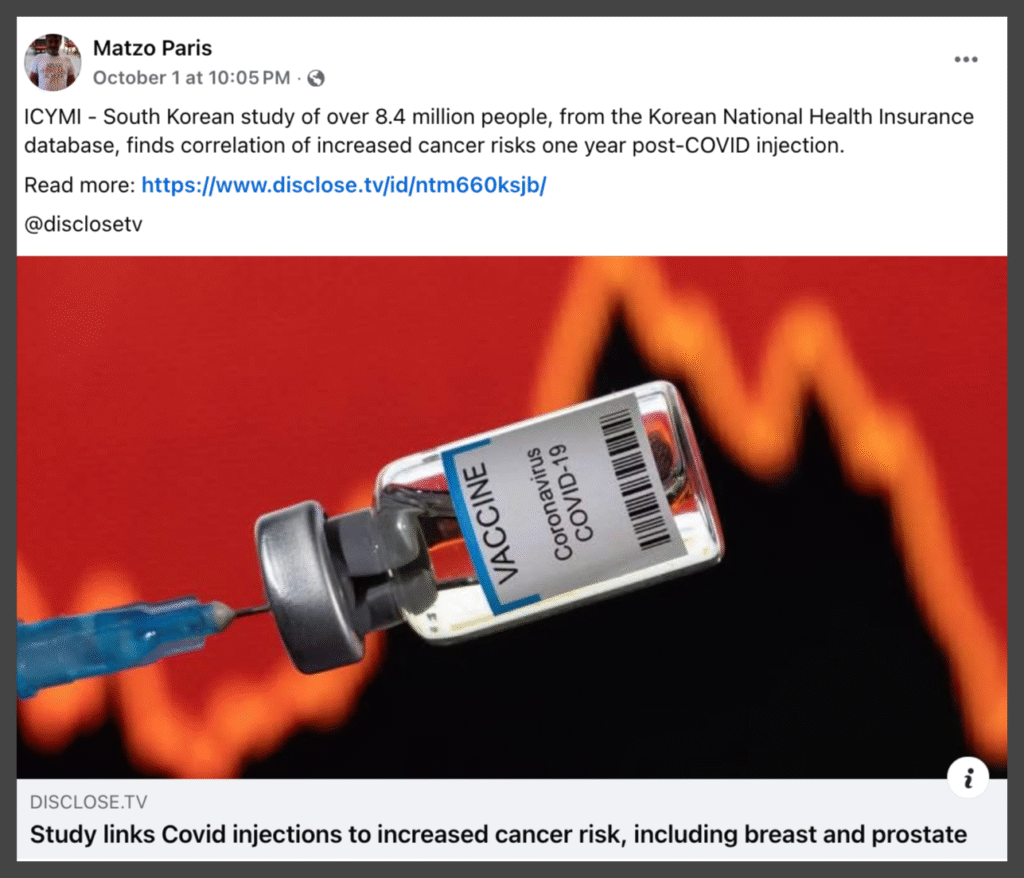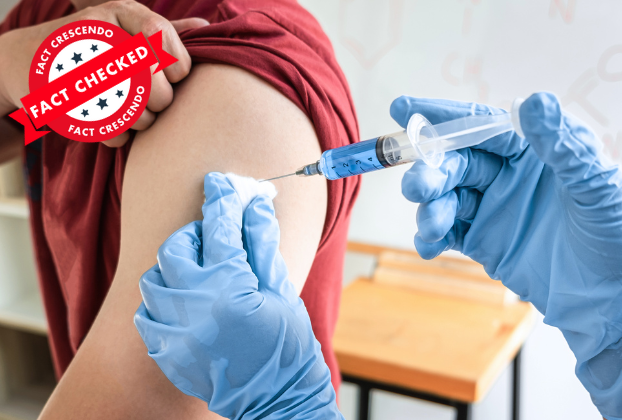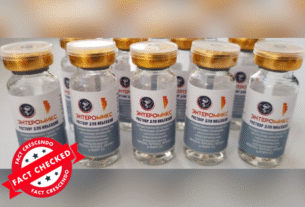In late September 2025, a South Korean study examining COVID-19 vaccination and cancer risk sparked widespread debate online. Multiple social posts claimed that the research “proved” vaccines cause cancer, citing increased risks for thyroid, lung, prostate, and other cancers. However, we found that the claim is missing context.
Social Media Posts
Multiple social media users recently shared the claim that a South Korean study found that COVID-19 vaccines caused cancer.


Fact Check
What the Study Did & What It Found
The study “1-year risks of cancers associated with COVID-19 vaccination” was published 26 September 2025 in Biomarker Research. It analyzed data from 8,407,849 individuals (2021–2023) drawn from Korea’s National Health Insurance database.
Researchers used a technique called propensity score matching to compare vaccinated and unvaccinated people fairly. They matched 1 vaccinated person to 4 unvaccinated people who were similar in age, sex, health conditions, and other factors. Then they used a statistical method called Cox proportional hazards models to calculate hazard ratios (HRs)—a measure of how much more (or less) likely vaccinated people were to be diagnosed with cancer within 1 year.
The study found statistically significant associations (HR greater than 1, with 95% confidence intervals that didn’t include 1) for six types of cancer:
- Thyroid: HR ~1.35 (meaning 35% higher risk, 95% CI 1.21–1.51)
- Gastric (stomach): HR ~1.34 (95% CI 1.13–1.58)
- Colorectal: HR ~1.28 (95% CI 1.12–1.47)
- Lung: HR ~1.53 (95% CI 1.25–1.87)
- Breast: HR ~1.20 (95% CI 1.07–1.34)
- Prostate: HR ~1.69 (95% CI 1.35–2.11)
However, when the researchers looked at all cancers combined, the hazard ratio was 1.01 (95% CI 0.95–1.06), which is not statistically significant (p ~ 0.803). This means there was no overall increase in cancer risk across all cancer types.
The study authors were careful to note: “Given the limited availability of real-world data, our population-based cohort study … suggested epidemiological associations … However, further studies are warranted to elucidate potential causal relationships.”
In other words, the paper identifies associations (patterns in the data) but does not claim vaccines cause cancer. The authors call for more research and caution against jumping to conclusions.
Why It Doesn’t Prove Causation: Key Methodological Considerations
Observational Design & Confounding: Because the study is observational (not a randomized trial), unmeasured confounders, such as lifestyle, socioeconomic status, or frequency of health checkups, could influence results. The researchers themselves acknowledge this limitation in the discussion section of the paper.
Detection / Surveillance Bias: People who receive vaccines may interact more with the health system; thus they may be more likely to be screened and have early-stage cancers detected. This surveillance bias
can make incidence appear higher without a true increase. A review on surveillance bias in cance explains how increased detection can produce spurious incidence differences. Another article discusses how differences in screening and detection practices produce bias in cancer statistics.
Time Window Too Short for Cancer Development: Most solid tumors take several years to develop. A one-year follow-up is too brief to reliably capture cancers caused by new exposures. The study design is not suited to detect de novo carcinogenesis in that timeframe.
No Mechanistic or Biological Evidence Provided: To claim that vaccines cause cancer, we would need a clear biological explanation of how the vaccine could trigger cancer development. The study doesn’t provide one. For comparison, when scientists study how certain viruses cause cancer (like HPV or hepatitis B), they can point to specific mechanisms: the virus alters the host’s genes, destabilizes DNA, or blocks tumor-suppressing proteins. No such mechanism has been identified for COVID-19 vaccines, which is a critical gap in any argument that they cause cancer.
What Experts Say
WHO spokesperson clarified in a response for Al Jazeera that this is an observational study, which is helpful for generating hypotheses and informing future research, but it cannot establish or prove a cause-and-effect relationship. No single study should be considered in isolation; results must be evaluated alongside all other available evidence.
The authors of the Biomarker Research paper themselves underscore caution in interpretation, explicitly stating that while they observed associations between COVID-19 vaccination and increased incidence of six cancer types, the study does not demonstrate causality and calls for further research to explore molecular mechanisms. Because the study uses public datasets from Korea’s National Health Insurance Service (NHIS) and is published as open access, readers can review the methods, data tables, and statistical models to assess whether the authors’ cautious wording is reflected in the original work.
Cancer researchers and epidemiologists point out that some cancers, especially thyroid and prostate, are often found during routine screening rather than because patients have symptoms. This means that what looks like a rise in cancer cases may actually just be an increase in detection, not a real increase in how often cancer occurs. Additionally, studies of how viruses cause cancer (such as this review of molecular mechanisms) show that virus-related cancers develop through well-understood processes: they disrupt DNA, cause ongoing inflammation, and progress through multiple steps over time, not from brief exposures like vaccination.
Taken together, these reactions emphasize that careful scientific interpretation is necessary: the study’s authors, its transparent data sources, expert caution about bias in interpretation, and existing knowledge of carcinogenic mechanisms together challenge any claim that the research “proves” vaccines cause cancer.
Context to Consider
Variation by Vaccine Type & Subgroup: The study breaks down associations by vaccine type (cDNA, mRNA, heterologous) and by sex and age groups. For example, cDNA vaccines were associated with increased risks of thyroid, gastric, colorectal, lung, and prostate cancers; mRNA vaccines were linked to thyroid, colorectal, lung, and breast cancers.
This heterogeneity raises questions: if there were a true causal effect, we’d expect more consistency. Subgroup signals may reflect statistical noise or differential bias.
Public Health & Vaccine Policy Context: COVID-19 vaccination remains a public health priority. Korean public health authorities continue recommending vaccination, particularly in high-risk groups, for prevention of severe disease. (E.g. COVID-19 Vaccination Recommendations for 2024–2025 in Korea article discusses ongoing vaccine policy)
Safety Data from Other Sources: So far, no major global or national surveillance system has reported a credible signal linking COVID-19 vaccines with increased cancer risk. Safety monitoring has focused on cardiac events, thrombosis, etc., but not carcinogenicity.
Conclusion
Overall, this claim misrepresents the study’s findings. The evidence shows correlation, not causation. The South Korean study published in September 2025 found statistical associations between COVID-19 vaccination and increased risks for certain specific cancers within one year, but it does not prove that vaccines cause cancer.
The study’s observational design, short follow-up period, potential for detection bias, and lack of biological mechanisms all limit the ability to draw causal conclusions. Experts emphasize the need for cautious interpretation and further research, while public health authorities continue to recommend COVID-19 vaccination based on its proven benefits in preventing severe disease.

Title:Did the Korean Study Prove COVID-19 Vaccines Cause Cancer?
Fact Check By: Pranpreeya PResult: Missing Context






